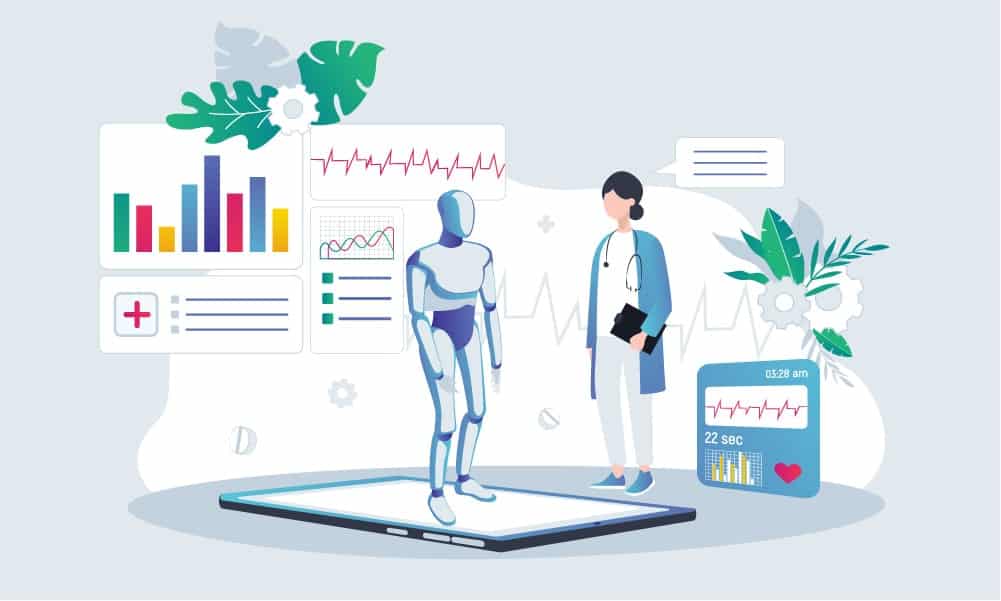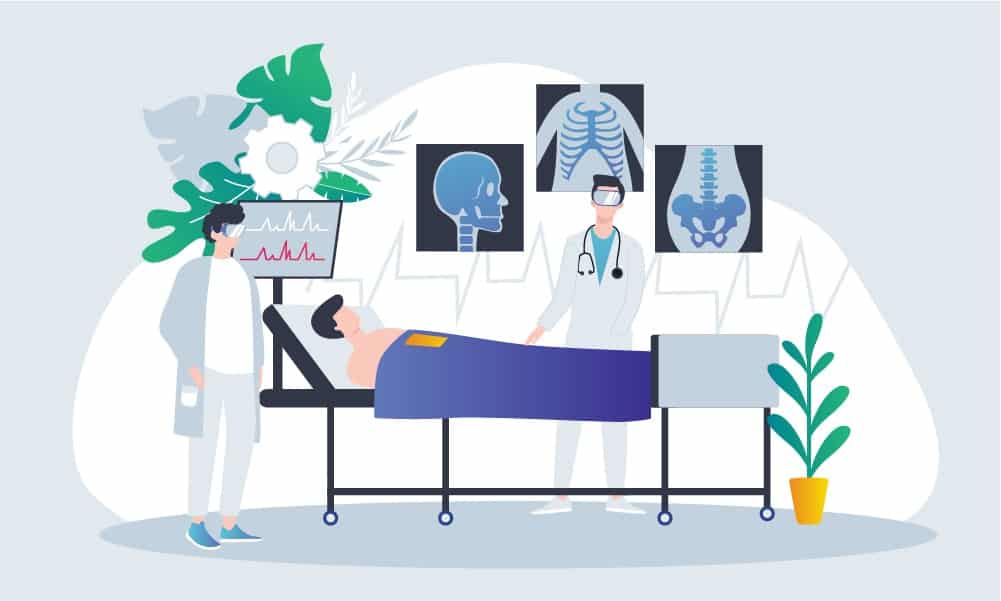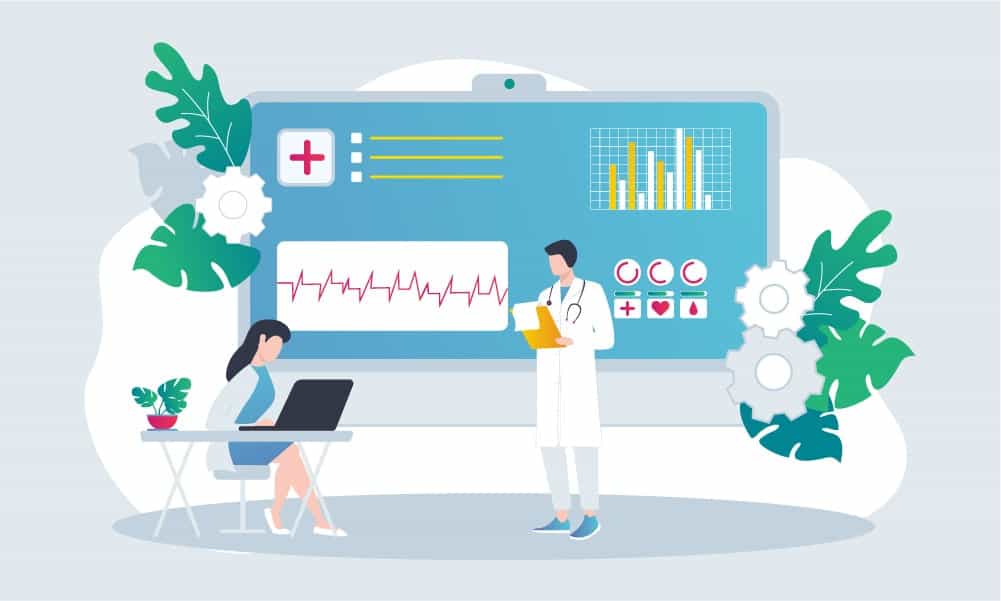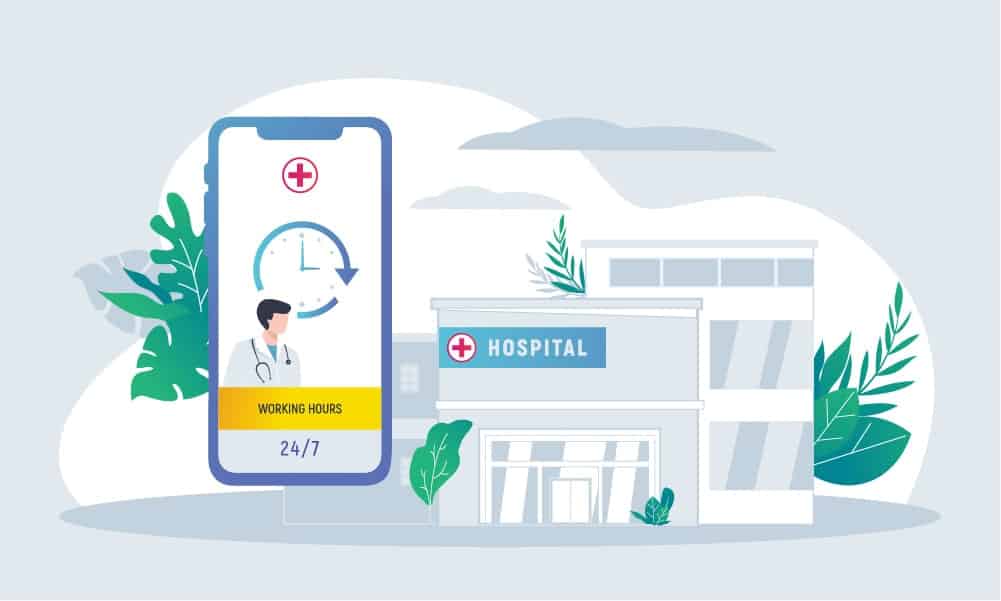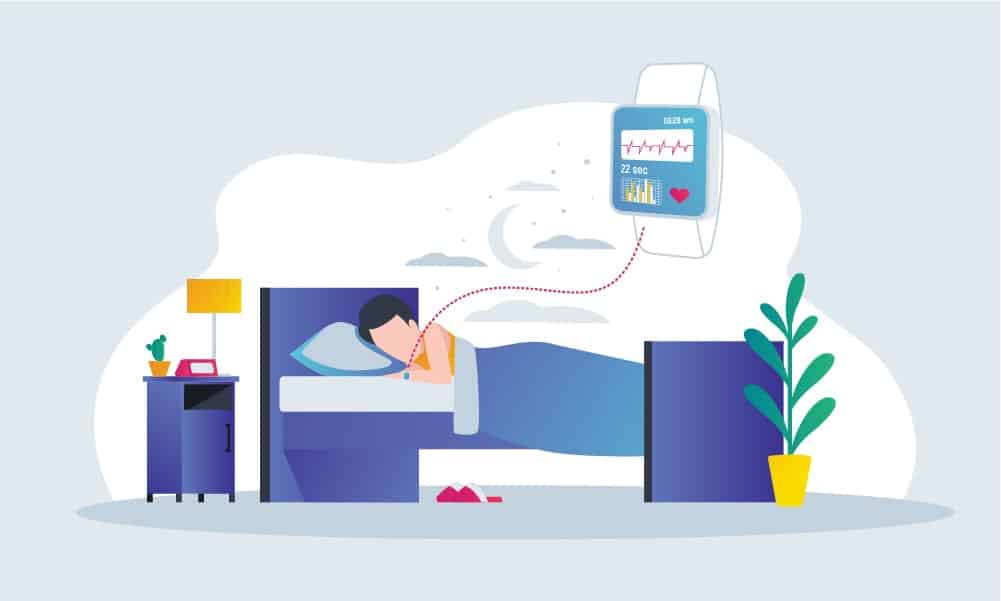The Healthcare industry is the one that is changing drastically this year. One of the biggest changes is the move to digital engagement. Partially it is one of the outcomes of pandemics, and partially, because people have become tech-savvy and demand faster, simpler medical services. According to research, 65% of Europe’s healthcare providers mentioned adopting digital technologies to support work and care settings in the previous year.
The driving force of the healthcare industry is the development of mobile health apps that have changed how people interact with services and the industry in general. Now, Google Store includes 52,652 apps, and App Store includes 51,370 top healthcare apps. The statistic shows that the medical mobile apps market worldwide is estimated to reach over $11 billion by 2025.
The healthcare sector includes all the businesses providing medical services, offering healthcare services to patients, developing medical equipment, etc. Let’s discover trends that startups can use as their medical app ideas.
- Healthcare Mobile Apps Trends in 2024
- mHealth
- Wearables
- AI-powered healthcare apps
- Electronic health records
- AR/VR in healthcare
- Requirements for Health App Ideas
- Authentication
- Security
- Cross-platform accessibility
- UI/UX design
- Push notifications
- Offline access
- 3rd party integrations
- Payment integration
- Healthcare App Ideas
- Doctor appointment/consultation app
- Health awareness application
- Chronic disease monitoring app
- Diet tracker. Weight loss/gain app
- Personal medical records app
- Hospital app
- Augmented reality app
- Sleep-tracking app
- Top Design Ideas for Healthcare Apps
- Color palette
- User experience
- Simplicity
- App logo
- Benefits of Healthcare apps for doctors and patients
- Our expertise
- Conclusion
Healthcare Mobile Apps Trends in 2024
To succeed with a medical startup you need to analyze trends and existing mobile app ideas for healthcare. Get to know what is the future of mobile app development.
mHealth
Examples of mHealth (Mobile + Health) usage include diagnosing patients remotely, controlling pregnancy, monitoring weight loss/gain, managing the lifestyle, etc. According to The Medical Futurist Institute, telemedicine is becoming a trend this year. Remote assistance through different devices will be a safe approach and a common tool within medical care. Even in emergency rooms, hospitals, and insurance offices. Advantages of telemedicine services include saved time, convenient online service regardless of your current location, confidentiality, etc.
Wearables
Wearable devices became popular a few years ago, partially because of the global move to a healthy lifestyle. Owners of fitness bracelets, that are connected to smartphones, count steps, calories, and water intake. Also, they check blood pressure, and heart rate, monitor physical activity, sleep cycles, etc. The survey states that approximately 45% of Americans have tried fitness trackers or mobile health apps and 20% are using both fitness trackers and apps.
Another trend related to wearables is producing trackers that show exact steps and track sleep without any flaws because these devices are not that accurate and people keep demanding accuracy.
AI-powered healthcare apps
Artificial intelligence alongside Big Data aims to improve and accelerate the result by analyzing and processing a vast amount of data and simplifying the decision-making process. Moreover, AI computing helps doctors diagnose more accurately and start treatment faster. Chatbots and symptom checkers can help healthcare workers by reducing the pressure on non-emergency helplines and patients to get 24/7 assistance with basic medical questions, reminders to take medication on time, or not to forget about the appointment.
Electronic health records
EHR stores patients’ medical data and provides official information to healthcare service providers. EMRs store data about specific conditions and serve as an electronic copy of disease history. According to statistics, the global EHR market is predicted to reach 40 billion U.S. dollars in 2024. Thanks to EHRs, hospitals access patients’ health data on the go and make everything ready faster than it usually would.
AR/VR in healthcare
The Healthcare industry adjusts to the technological pace and digital capabilities. Augmented reality and Virtual reality are great technologies and useful tools in the medical field and education, so they can be used as an immersive teaching methods for medical students. Using equipment (glasses, headsets, hand controllers, etc) makes interns and surgeons learn the theory and have virtual training on the spot.
Requirements for Health App Ideas
Authentication
A reliable verification process gives the impression of a secure platform and high-class work of engineers. The application can support access from numerous accounts with two-factor authentication (via SMS or Google Authenticator, email, phone number, or other specific ways.
Security
Personal health information is a sensitive matter. Developers have to ensure that all sensitive user data is encrypted by following the rules of the Health Insurance Portability and Accountability Act (HIPAA) or/and General Data Protection Regulation (GDPR) and other healthcare-related compliance depending on the innovative ideas for healthcare apps you develop.
Cross-platform accessibility
Cross-platform apps with less coding and better personalization are among mobile development trends in 2024. Such development means that apps are compatible with different platforms and devices. The most popular cross-platform mobile framework is Flutter. Engineers use the same codebase for five operating systems: iOS, Android, macOS, Windows, and Linux. Also, the new version allows development for more browsers: Chrome, Safari, Firefox, and Edge. This makes Flutter a cost and time-effective tool for startups.
UI/UX design
It is no news that mobile applications with attractive designs look more convenient for potential users. Don’t forget about the visual part, user interface, and user experience of your future app.
Push notifications
Another feature that attracts users is 24/7 availability, updates for any security reasons, and customizable notifications that allow them to stay up to date, especially regarding health issues.
Offline access
Healthcare apps that provide offline mode seem more convenient and user-friendly than those that depend only on the internet connection which is an unstable matter regardless of location.
3rd party integrations
Healthcare apps should be able to connect to platforms (Apple Health, Google Fit, and Samsung Health) and various measurement devices like smartwatches, to perform their functions properly.
Payment integration
Integrating payment methods with mobile applications makes them more convenient for users. A customer can quickly pay for a product and a seller receives payment directly to the account, no matter what the distance between them. Another benefit of a money transfer system is the secure transfer of any currency, and no dependency on whether to pay an invoice or move funds among subsidiaries. According to statistics, the segment of money transfers and digital remittance accounts for $106,925 million. Online and mobile wallet payments accounted for 44.5 percent of online transactions worldwide.
Healthcare App Ideas
Here are the main categories of healthcare apps:
- Health management apps – provide information on conditions and enable access to remote treatment
- Wellness management apps – facilitate tracking and improvement of your lifestyle.
- Telemedicine apps – provide virtual care by licensed medical experts.
Let’s explore some medical app ideas that you can implement in the healthcare sector. And, the app design cost.
Doctor appointment/consultation app
An on-demand doctor app can help simplify communication between the doctors and patients who wish to book an appointment. Through such apps, patients access their medical records, find specialists and check their availability (office hours) at hospitals.
Health awareness application
It’s important to be educated about general health and wellness issues but it is crucial to learn from reliable sources created by experts. An application allows doctors to create a useful platform by sharing knowledge regarding different medical topics. The other advantages are:
- reduction of common patient stereotypes and mistakes
- time-saving, etc.
This app can also keep track of patients’ health regularly.
Chronic disease monitoring app
By inputting personal health data daily, patients with chronic diseases can be continuously monitored by doctors. It is a time-saving and convenient way to maintain good health conditions.
Diet tracker. Weight loss/gain app
The workout app segment accounted for the largest revenue share in 2020 owing to the COVID outbreak and increasing obesity. Everyone who leads a healthy lifestyle and wants to monitor their health condition is a potential user of such an application. The global fitness app market is expected to grow by $15.59 billion by 2028, Such platforms enable users to remain fit by counting calories, monitoring dieting, providing sports exercises, etc.
Personal medical records app
A personal medical record app relates to the idea mentioned above. The app enables users to upload their health data and track it by themselves or share it with the doctors before making an appointment. This kind of solution will enable a doctor to examine the patient’s history and depending on that, doctors can assign medicine and make the next move.
Hospital app
Medical facility application is an efficient tool that makes institutions stand out among their competitors. Mobile apps can include reviews of hospitals, ratings of their services, and necessary information about doctors. In our opinion, the advantages of the app include transparency of feedback and a time-saving platform for potential clients.
You can also think about the mobile app that offers the same services like gyms, health centers, and fitness clubs in a city. Any business with a mobile app seems more convenient for the tech-savvy generation.
Augmented reality app
Here is an idea to develop an application for medical students and doctors who want to extend their expertise. AR technology provides proper training with the help of simulations, creates human body models that allow learning anatomy, and practices surgeries on virtual patients. For example, Yale School of Nursing instructs students to practice medical procedures using a program that visualizes health problems using smartphones. Western Reserve University with Cleveland Clinic launched an app that allows you to hear heartbeats while learning the function of different parts of the heart. This makes the learning process immerse and complete.
Sleep-tracking app
Recent years are recognized as years of anxiety and sleep disorders. Sleep apps can be a solution for people to reduce stress and pressure caused by a variety of factors: pandemics, work schedules, or other personal issues. Users can select some relaxing music, or meditation audio, set a timer, and finally get some sleep. To stand out from similar platforms, think about features that include advice from sleep doctors.
Top Design Ideas for Healthcare Apps
What concerns design app ideas for healthcare, there are several nuances to think about. For instance,
Color palette
According to the market trends, and the medical sector, there are specific colors that can be used for healthcare applications. Look through the colors the already-existing apps propose. There are different tints and shades of blue, marine, and lilac, like here.
These colors have not been chosen randomly. All of them represent healthcare and evoke medical connotations when the app is created in these colors. The colors should be soft, user-friendly, and aesthetic. Some of the apps may also provide color palettes for people with vision impairment (colorblind, yellow screens, etc.)
User experience
The user persona is the main character, who will use your medical app. So, the main idea has to be super user-centric. Design a clickable prototype of an app that has logical navigation, clear text, relevant logos, and signs. This way the user will have no difficulty in going through the app and fulfilling the medical aim he/she has.
Simplicity
A simple app is a key to everything. The best healthcare mobile app ideas for startup beginners have to be innovative and up-to-the-point. If it is a health fitness tracker, then it should not have any additional information, ads, or lots of links. Many users don’t like when the screen is cramped and it is hard to find something useful within the app. So, think twice before making the final decision.
App logo
The healthcare app name seems to be a trivial task. But, don’t be that sure. Many apps have nice names, but they are not catchy enough to be remembered. Your ideas for healthcare apps should keep that in mind. Be laconic, transfer your app’s purpose onto its name. Maybe, make additional research on the competitive market. Besides, the medal has two sides. There might be business ideas for doctors and users. These audiences require different app-building approaches.
Benefits of Healthcare apps for doctors and patients
Today mobile application is a common thing for most industries that use them to enhance their performance and follow tech-savvy trends. The usage of healthcare apps grew among not only healthcare workers but people who care about their health. Let’s take a look at some benefits healthcare apps bring their users:
- A convenient way of managing and accessing the health record of patients
- Time-saving method of communication between doctors and patients
- The great process of reduction of healthcare costs
- A useful tool for gathering medical information
- Improved speed and efficiency of healthcare delivery
- A helpful approach to increase awareness and the medical knowledge of the patients
- An easier way to find experts and get in touch with them
Our expertise
Inoxoft constantly analyses the software development market and knows all the development trends. Thus, we also have experience in custom mHealth app development that is innovative and in-demand among users. See our custom android application development services. Our team developed and launched a telemedicine app for the on-demand healthcare service. The application works on mobile devices and tablets.
Features include a live video possibility for face-to-face “doctor-patient” connection, and patient 24/7 support chat, where patients could create an appointment. Also, the app allows patients to access their medical records, and view online doctor visit records, doctor’s prescriptions, and other details. The app was developed following HIPPA compliance. So, we position ourselves as a telemedicine app development company.
Writing a business plan for a software startup can be easy! Click here to see what Inoxoft thinks about business planning! And, find out, what we offer as our software development services for startups.
Writing a business plan for a software startup can be easy! Click here to see what Inoxoft thinks about business planning!
Conclusion
There is a lot of potential for mobile app development in the healthcare industry. If you have ideas and are looking for a team to implement them, contact us to get insights and start the mhealth app development process.
Frequently Asked Questions
Which apps are the most used in healthcare industry?
- Mhealth
- Wearables
- Ai-powered
- EHRs
- AR/VR-based
What are the simplest app ideas for healthcare startup?
- Doctor appointment
- Disease monitoring
- Diet tracker
- Sleep tracker
- Hospital apps
What are the best ideas for healthcare apps?
Don’t neglect to make a research to produce the right:
- Color palette
- UX
- Simplicity
- App logo





